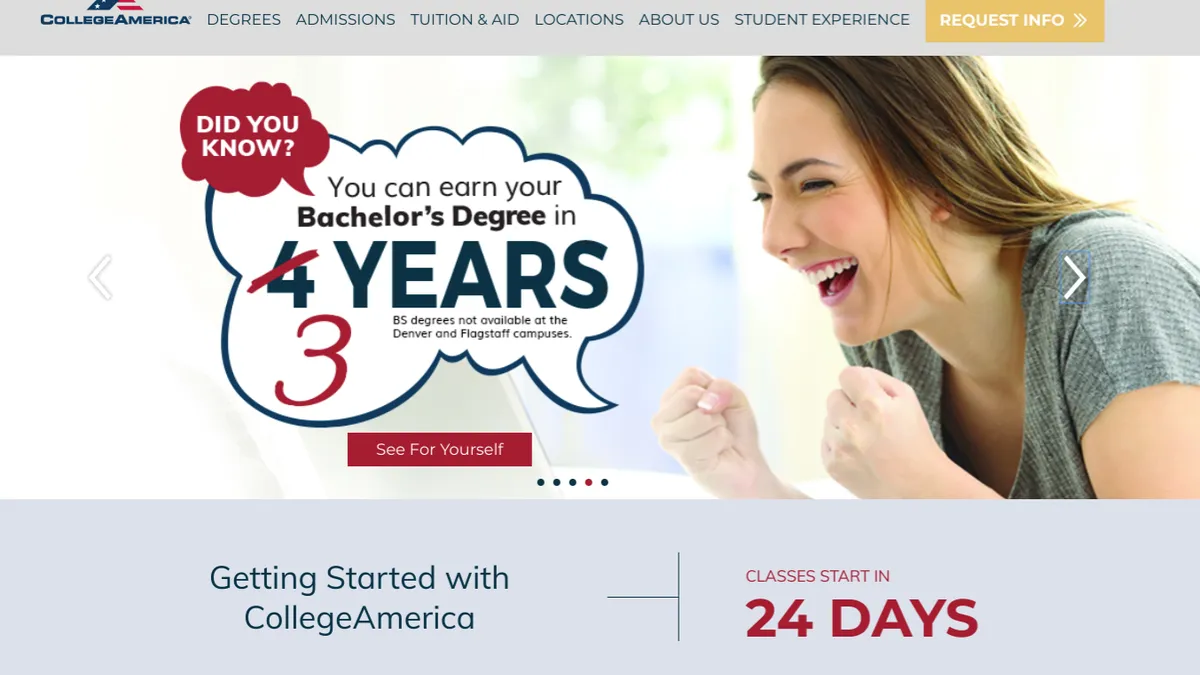Dive Brief:
- The Center for Excellence in Higher Education (CEHE) saw the accreditation of its CollegeAmerica chain renewed earlier this month, but it remains on system-wide probation following a critical review of its business practices in September.
- First reported by the Republic Report, the move to continue sanctions includes stopping enrollment in 10 programs until CEHE "demonstrates significant improvement in student achievement," according to a letter from the Accrediting Commission of Career Schools and Colleges (ACCSC) issued May 2. It also must provide outcomes information for 30 other offerings, along with details on the teach-out status of its discontinued programs.
- In the letter, the ACCSC also asked for verification of claims made in CEHE's promotional materials that it alleges are misleading.
Dive Insight:
In an 80-page letter sent by ACCSC in September that put CEHE's 11 campuses on probation, the accreditor claimed the operator used misleading and concerning marketing tactics and went so far as to discriminate against some students based on their Native American heritage.
The accreditor has also expressed concern over CEHE's "demonstrated commitment to student success and to meaningful self-assessment and improvement processes," according to the May 2 letter.
That letter, which stems from the accreditor's February review, acknowledged a "shift in tone" by CEHE "toward taking the action required to achieve and demonstrate compliance." ACCSC also noted CEHE "has begun the process of candid self-evaluation and is working to develop realistic solutions" to compliance issues raised by the accreditor.
But that's not enough to halt the continuation of its probation status. It follows the agreed-upon dismissal in December of CEHE's lawsuit challenging the U.S. Education Department's decision to not recognize its conversion to a nonprofit for Title IV purposes, the Republic Report notes.
The Obama administration had expressed concern that the conversion was done in part "to evade certain regulatory requirements" that apply specifically to for-profit colleges, according to court filings. And a review of for-profit-to-nonprofit conversions by The Century Foundation calls attention to the potential for the colleges' owner to unfairly benefit from the transaction.
Confronting tighter regulations and more competition from nonprofit institutions online, for-profit colleges are changing their business models. Some are dropping college brands to operate instead as educational services providers, while others are shedding campuses and reconfiguring to compete solely online, according to a recent Brookings Institution report.
Yet a spate of high-profile closures of for-profit colleges in late 2018 indicate the sector is still under scrutiny. The mechanisms designed to alert the market to an institution's potential insolvency may not be working as intended.
Observers say private equity investors' fateful interest in for-profit colleges may be reviving ahead of a possible economic contraction — though the prospect of further regulation, a potential outcome of a Democratic victory in 2020, could put them off.
In addition to CollegeAmerica, CEHE also runs Stevens-Henager College, California College San Diego and Independence University. ACCSC will review the latest round of information requested from CEHE at its August 2019 meeting.














